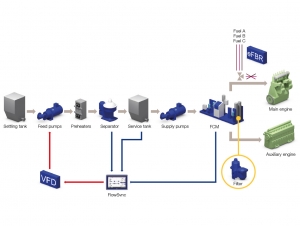


(Posted on 03/09/18)
Alfa Laval has a unique depth of expertise in marine fuel treatment, encompassing not just fuel separators but the whole chain from bunker tank to engine. As on-board operations change in response to fuel sulphur regulations, the company is optimizing and updating the technologies in its portfolio to meet the new challenges. The result will be improved engine protection and increased energy efficiency, despite more varied and less predictable fuels.
With the global sulphur cap taking in effect in 2020, onboard fuel handling will become more complicated than ever before. “There will be many options for compliance and every vessel will have to choose the route that makes most sense for their operation,” explains Serdar Sengun, Global Sales Manager Marine Separation, Alfa Laval. “No matter what customers choose, it will have dramatic implications for the fuel line. But Alfa Laval is taking a complete and forward-thinking approach to fuel line optimization.”
A number of new fuels and fuel blends have already entered the market, and more are likely to appear once the global sulphur cap is in place. For many fleets, 2020 will also mean going from existing single-fuel systems to multi-fuel operations. If not managed properly, using multiple fuel oils can result in a variety of issues – especially when the fuels are unfamiliar. The problems can range from clogged fuel systems to, in the worst case, engine stoppage.
“As refineries recalibrate for lower sulphur content, we also anticipate a continued increase in the proportion of cat fines in marine fuel oils,” adds Sengun. “Already, we have seen a huge rise in cat fines, which cause major problems if not separated from the fuel before it reaches the engine.”
Meeting the challenges of more varied fuels will affect the fuel line as a whole. Centrifugal separators, which are the primary defence against cat fines, will need to perform at different capacities and with new levels of efficiency. Fuel conditioning systems will need to handle fuels with more widely differing properties, using embedded automation to avoid handling mistakes and perform safe changeover within the required engine parameters. Overall, the existing synergies between fuel line equipment and the engine itself will need to be strengthened.
“Matching the separator feed to engine load is critical to achieving the highest efficiency and engine protection, as field tests have clearly shown,” says Sengun. “After separation, matching the fuel to the maker’s specifications is critical for the engine, its injection systems and the safety of the vessel. All of these processes have to occur smoothly and safely, no matter what fuel is used.”
Alfa Laval is focused on ensuring technology that will reliably support customers in 2020 and beyond. As well as introducing improved touchscreen control for the Alfa Laval fuel line, the company will optimize and update key equipment within it prior to the global sulphur cap. This includes Alfa Laval FlowSync, the company’s unique solution for automatically adjusting the separator feed, as well as the Alfa Laval FCM One Oil. Launched in 2014 and already capable of advanced fuel changeover and managing up four different fuels, the FCM One Oil will be released in a new version by the end of 2018.
“As the market’s only supplier offering solutions and expertise for the entire fuel line, we are helping customers adapt today to the changes that are coming tomorrow,” says Sengun. “No matter how vessels decide to meet the global cap, Alfa Laval technology will bring them the protection, efficiency and performance they need.”
Rio Tinto’s first Pilbara-made iron ore rail car has rolled off the production line in Karratha... Read more
Precision meets progress at Phu My Port, Vietnam. The LPS 550 has been deployed to handle bulk commodities... Read more
bound4blue, a global leader in wind propulsion systems, has expanded its industrial footprint in Asia... Read more
As the industry explores multiple decarbonisation pathways, methanol is gaining attention as a practical... Read more
Technology group Wärtsilä will supply an integrated hybrid propulsion system for a bulk carrier... Read more
Superior Industries, Inc., a US-based manufacturer and global supplier of bulk material processing and... Read more
ESL Shipping has taken a significant step forward in digitalisation by deploying a new multichannel... Read more
Condition Monitoring Technologies (CMT) has deepened its presence across Asia’s most influential... Read more
After delivering its first full-scale seagoing project last week, Wattlab signed a contract at Europort... Read more
Steelpaint GmbH has reported strong growth in orders for corrosion protection coatings on Germany&rsquo... Read more